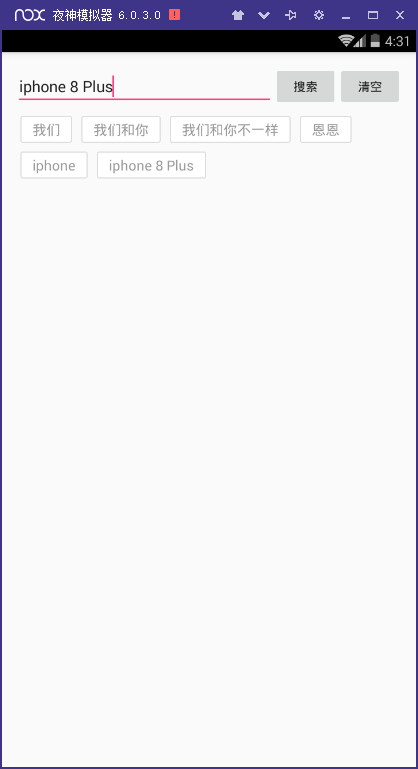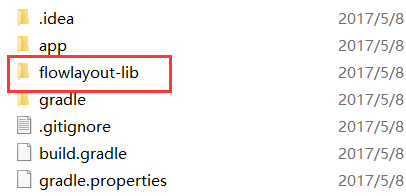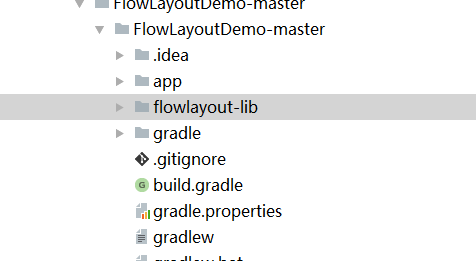本文实例为大家分享了FlowLayout实现搜索清空历史记录的具体代码,供大家参考,具体内容如下
效果图:点击搜索框将搜索的历史在流式布局中展示出来,清空历史记录就会将历史清空,每次搜索后都存入sp中,每次进入页面都先判断sp里是否有值并展示

首先需要导入一个module,下载地址
下载完这个工程后,需要将里面的flowlayout-lib导入到工程中,

导入工程的步骤:File - New - Import Module 选中这个flowlayout-lib

导入完成后,在项目的build.gradle中对导入的module进行依赖
compile project(':flowlayout-lib') activity_main.xml
<LinearLayout xmlns:android="http://schemas.android.com/apk/res/android" xmlns:app="http://schemas.android.com/apk/res-auto" xmlns:tools="http://schemas.android.com/tools" android:layout_width="match_parent" android:layout_height="match_parent" android:orientation="vertical" android:padding="16dp" tools:context="com.example.searchhistory.MainActivity"> <LinearLayout android:layout_width="match_parent" android:layout_height="wrap_content" android:gravity="center_vertical" android:orientation="horizontal"> <EditText android:id="@+id/edt" android:layout_width="0dp" android:layout_height="wrap_content" android:layout_weight="4" /> <Button android:id="@+id/btn" android:layout_width="0dp" android:layout_height="wrap_content" android:layout_weight="1" android:text="搜索" /> <Button android:id="@+id/clear" android:layout_width="0dp" android:layout_height="wrap_content" android:layout_weight="1" android:text="清空" /> </LinearLayout> <ScrollView android:layout_width="match_parent" android:layout_height="match_parent"> <com.zhy.view.flowlayout.TagFlowLayout android:id="@+id/id_flowlayout" android:layout_width="fill_parent" android:layout_height="wrap_content" app:max_select="-1" /> </ScrollView> </LinearLayout>
tv.xml
<TextView xmlns:android="http://schemas.android.com/apk/res/android" android:layout_width="wrap_content" android:layout_height="wrap_content" android:layout_marginLeft="5dp" android:layout_marginRight="5dp" android:layout_marginTop="10dp" android:background="@drawable/tag_bg" android:text="Helloworld" android:textColor="#999999" android:textSize="16sp"> </TextView>
drawable下面创建
checked_bg.xml
<?xml version="1.0" encoding="utf-8"?> <shape xmlns:android="http://schemas.android.com/apk/res/android"> <solid android:color="#ffffff" /> <corners android:radius="2dp" /> <stroke android:width="1dp" android:color="#dddddd" /> <padding android:bottom="5dp" android:left="14dp" android:right="14dp" android:top="5dp" /> </shape>
normal_bg.xml
<?xml version="1.0" encoding="utf-8"?> <shape xmlns:android="http://schemas.android.com/apk/res/android"> <solid android:color="#ffffff" /> <corners android:radius="2dp" /> <stroke android:width="1dp" android:color="#dddddd" /> <padding android:bottom="5dp" android:left="14dp" android:right="14dp" android:top="5dp" /> </shape>
tag_bg.xml
<?xml version="1.0" encoding="utf-8"?> <selector xmlns:android="http://schemas.android.com/apk/res/android"> <item android:drawable="@drawable/checked_bg" android:state_checked="true"> </item> <item android:drawable="@drawable/normal_bg"></item> </selector>
text_color.xml
<?xml version="1.0" encoding="utf-8"?> <selector xmlns:android="http://schemas.android.com/apk/res/android"> <item android:color="#999999" android:state_checked="true" /> <item android:color="#f692ff" /> </selector>
MainActivity
public class MainActivity extends AppCompatActivity { private TagFlowLayout mFlowLayout; private EditText editText; private Button button; private List<String> strings; String history=""; int a=0; List<String> historylist = new ArrayList<>(); //布局管理器 private LayoutInflater mInflater; //流式布局的子布局 private TextView tv; public Handler handler = new Handler() { @Override public void handleMessage(Message msg) { switch (msg.what) { case 1: mFlowLayout.setAdapter(new TagAdapter<String>(strings) { @Override public View getView(FlowLayout parent, int position, String s) { tv = (TextView) mInflater.inflate(R.layout.tv, mFlowLayout, false); tv.setVisibility(View.VISIBLE); tv.setText(s); return tv; } }); break; } super.handleMessage(msg); } }; private Button clearbtn; @RequiresApi(api = Build.VERSION_CODES.M) @Override protected void onCreate(Bundle savedInstanceState) { super.onCreate(savedInstanceState); setContentView(R.layout.activity_main); mInflater = LayoutInflater.from(this); mFlowLayout = (TagFlowLayout) findViewById(R.id.id_flowlayout); editText = (EditText) findViewById(R.id.edt); button = (Button) findViewById(R.id.btn); clearbtn = findViewById(R.id.clear); final SharedPreferences preferences = getSharedPreferences("config", 0); final SharedPreferences.Editor editor = preferences.edit(); strings = new ArrayList<>(); final String string = preferences.getString("string", " "); String[] split = string.split(" "); if (split.length>0&&!string.equals(" ")){ for (int i=0;i<split.length;i++){ strings.add(split[i]); } handler.sendEmptyMessageDelayed(1, 0); } clearbtn.setOnClickListener(new View.OnClickListener() { @Override public void onClick(View view) { history=""; historylist.clear(); editor.clear().commit(); //清空下面的 strings.clear(); handler.sendEmptyMessageDelayed(1, 0); } }); button.setOnClickListener(new View.OnClickListener() { @RequiresApi(api = Build.VERSION_CODES.M) @Override public void onClick(View v) { String string = preferences.getString("string", ""); historylist.clear(); if (!editText.getText().toString().trim().equals("")) { String aa = editText.getText().toString().trim(); Set<String> set = new ArraySet<>(); set.add(aa); historylist.add(aa); a++; history+= aa+" "; for (int i=0;i<historylist.size();i++){ editor.putString("string",history).commit(); strings.add(historylist.get(i)); } //通知handler更新UI handler.sendEmptyMessageDelayed(1, 0); }else{ Toast.makeText(MainActivity.this, "请输入要搜索的内容", Toast.LENGTH_SHORT).show(); } } }); //流式布局tag的点击方法 mFlowLayout.setOnTagClickListener(new TagFlowLayout.OnTagClickListener() { @Override public boolean onTagClick(View view, int position, FlowLayout parent) { Toast.makeText(MainActivity.this, tv.getText(), Toast.LENGTH_SHORT).show(); return true; } }); } } 以上就是本文的全部内容,希望对大家的学习有所帮助,也希望大家多多支持VEVB武林网。
注:相关教程知识阅读请移步到Android开发频道。